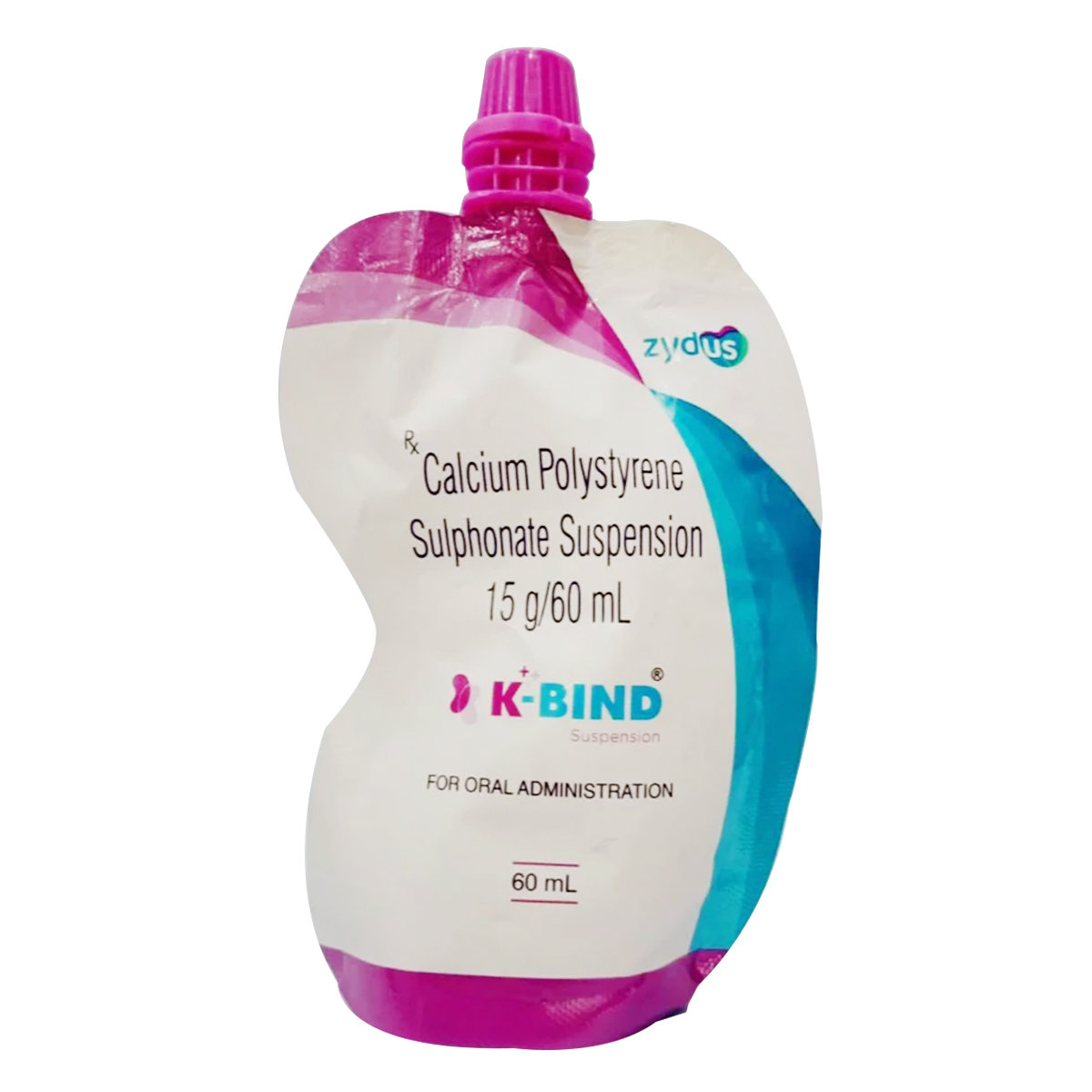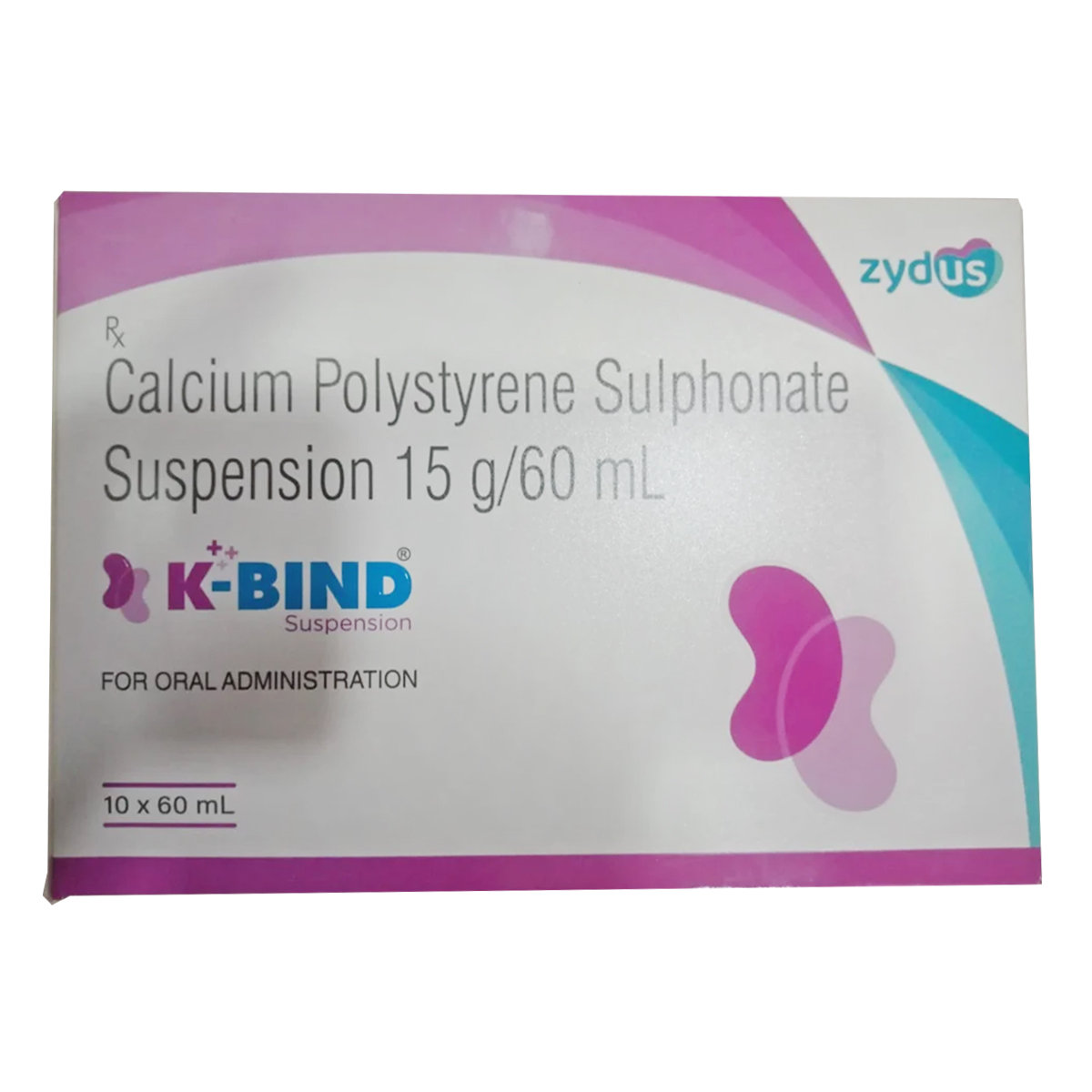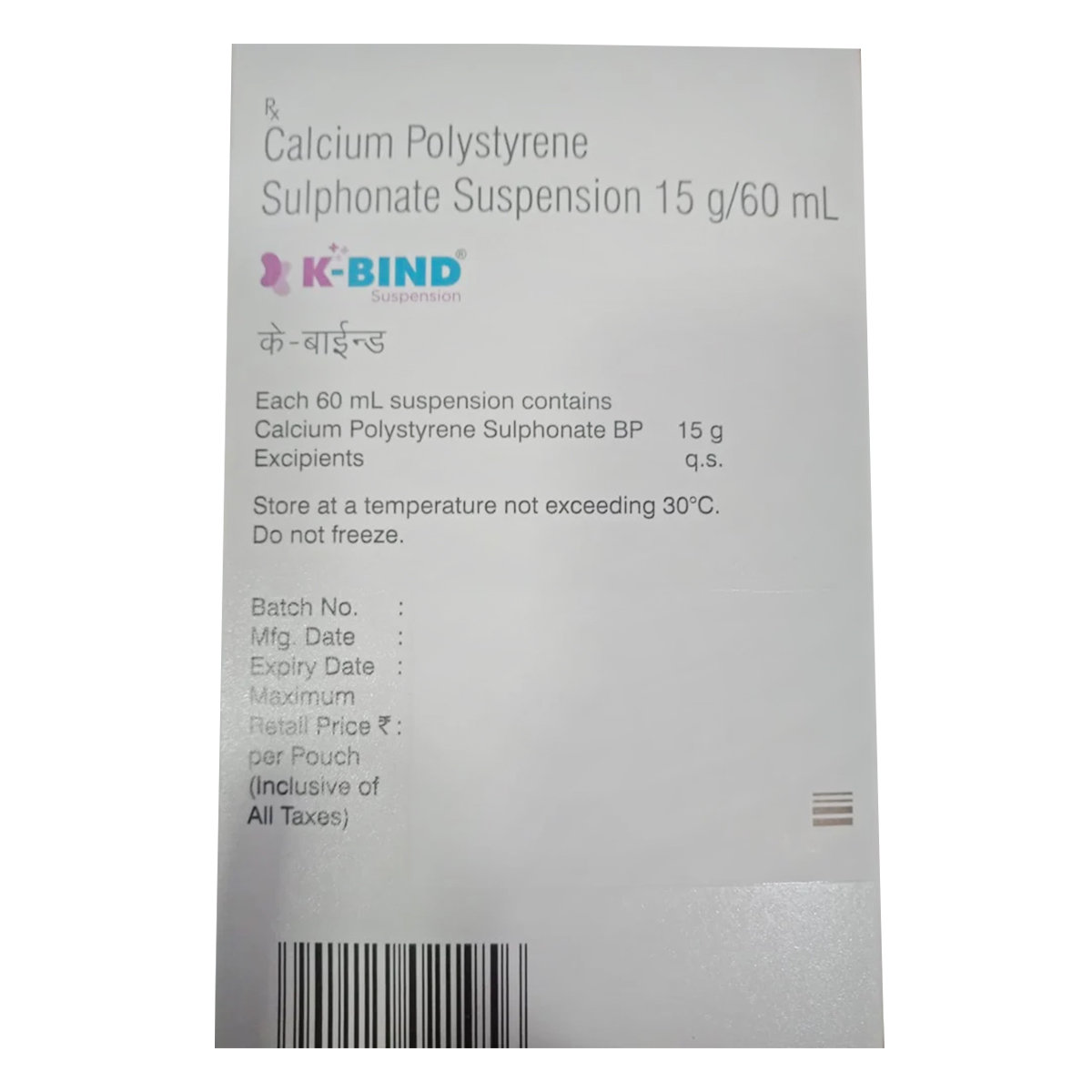K-Bind 15G Suspension 60 ml






MRP ₹168.5
(Inclusive of all Taxes)
₹25.3 Cashback (15%)
Provide Delivery Location
Online payment accepted
 Prescription drug
Prescription drugWhats That
Composition :
Manufacturer/Marketer :
Consume Type :
Return Policy :
Expires on or after :
About K-Bind 15G Suspension
K-Bind 15G Suspension belongs to a group of medications called 'ion exchange resins'. It is used to treat something called 'hyperkalaemia'. It is used in patients with kidney problems and on dialysis. Hyperkalaemia (High Potassium) is a medical problem where you have too much potassium in your blood. Your body needs potassium. It is a key vitamin that may be found in various foods. Potassium aids in the proper functioning of your nerves and muscles, including your heart. Unfortunately, having too much potassium in your blood might be dangerous. It has the potential to cause major cardiac issues.
K-Bind 15G Suspension contains calcium polystyrene sulphonate, which is administered to decrease potassium's blood levels in the body, reducing the risk of 'hyperkalaemia' due to high potassium levels. It works by eliminating excess potassium from your system in order to restore your levels to normal.
K-Bind 15G Suspension is administered by a healthcare professional. Do not self-administer this medicine on your own. You should complete the course of the treatment as per the doctor's advice based on blood tests results. In some cases, you may experience Hypokalaemia and hypocalcaemia, muscle cramps, feeling tired, having muscle weakness, cramps or a change in heart rate. Most of these side effects of K-Bind 15G Suspension do not require medical attention and gradually resolve over time. However, if the side effects persist or worsen, please consult your doctor.
If you are allergic to K-Bind 15G Suspension or any other medicines, please tell your doctor. If you are pregnant or breastfeeding, think you may be pregnant, or plan to have a baby, ask your doctor or pharmacist for advice before using this medicine. The dose is also worked out for children according to how much the child weighs. Children and babies must be given a suitable dose. Children and newborns may experience severe constipation if too much is given. While you are taking this medicine, your doctor may perform routine blood tests on you. This is done to determine the quantities of salts in your blood, such as potassium, sodium, calcium, and magnesium.
Uses of K-Bind 15G Suspension
Directions for Use
Medicinal Benefits
K-Bind 15G Suspension belongs to a group of medicines called 'ion exchange resins'. K-Bind 15G Suspension contains calcium polystyrene sulphonate, which is administered to decrease potassium's blood levels in the body, thereby reducing the risk of 'hyperkalaemia' due to high potassium levels. It works by eliminating excess potassium from your system in order to restore your levels to normal.
Storage
- Preventing Vomiting (Before it Happens)
- Take medication exactly as prescribed by your doctor. This can help minimize side effects, including vomiting.
- Having a small meal before taking your medication can help reduce nausea and vomiting.
- Talk to your doctor about taking anti-nausea medication along with your prescribed medication.
- Managing Vomiting (If it Happens)
- Try taking ginger in the form of tea, ale, or candy to help alleviate nausea and vomiting.
- What to Do if Vomiting Persists
- Consult your doctor if vomiting continues or worsens, consult the doctor for guidance on adjusting your medication or additional treatment.
- Inform Your Doctor: Notify your doctor immediately about your diarrhoea symptoms. This allows them to adjust your medication or provide guidance on managing side effects.
- Stay Hydrated: Drink plenty of fluids to replace lost water and electrolytes. Choose water, clear broth, and electrolyte-rich drinks. Avoid carbonated or caffeinated beverages to effectively rehydrate your body.
- Follow a Bland Diet: Eat easy-to-digest foods to help firm up your stool and settle your stomach. Try incorporating bananas, rice, applesauce, toast, plain crackers, and boiled vegetables into your diet.
- Avoid Trigger Foods: Steer clear of foods that can worsen diarrhoea, such as spicy, fatty, or greasy foods, high-fibre foods, and dairy products (especially if you're lactose intolerant).
- Practice Good Hygiene: Maintain good hygiene to prevent the spread of infection. To stay healthy, wash your hands frequently, clean and disinfect surfaces regularly, and avoid exchanging personal belongings with others.
- Take Anti-Diarrheal Medications: If your doctor advises, anti-diarrheal medications such as loperamide might help manage diarrhoea symptoms. Always follow your doctor's directions.
- Keep track of your diarrhoea symptoms. If they don't get better or worse or are accompanied by severe stomach pain, blood, or dehydration signs (like extreme thirst or dark urine), seek medical help.
Drug Warnings
If you are allergic to K-Bind 15G Suspension or any other medicines, please inform your doctor. If you are pregnant or breastfeeding, think you may be pregnant, or plan to have a baby, ask your doctor or pharmacist for advice before using this medicine. The dose is also worked out for children according to how much the child weighs. Children and babies must be given a suitable dose. Children and newborns may experience severe constipation if too much is given. While taking this medicine, your doctor may perform routine blood tests on you. This is done to determine the quantities of salts in your blood, such as potassium, sodium, calcium, and magnesium. Before taking K-Bind 15G Suspension, inform your doctor about your medical history and all medications you are currently taking in order to rule out any potential side effects.
Drug-Drug Interactions
Drug-Drug Interactions
Login/Sign Up
Drug-Food Interactions
Drug-Food Interactions
Login/Sign Up
Side Effects of K-Bind 15G Suspension
- Hypokalaemia
- Hypocalcaemia
- Muscle cramps
- Feeling tired
- Confused
- Having muscle weakness
- Cramps or a change in heart rate
- Feeling sick
- Being sick
- Constipation or diarrhoea
- Stomach upset
- Pain in your gut
- Loss of appetite
Habit Forming
Therapeutic Class
All Substitutes & Brand Comparisons
Author Details
We provide you with authentic, trustworthy and relevant information
Drug-Diseases Interactions
Drug-Diseases Interactions
Login/Sign Up
FAQs
K-Bind 15G Suspension contains calcium polystyrene sulphonate, which belongs to a group of medicines called 'ion exchange resins. It is used to treat a medical condition known as 'hyperkalaemia.' This occurs when your blood has excessive potassium. It works by eliminating excess potassium from your system in order to restore your levels to normal.
The most common cause of genuinely high potassium (hyperkalemia) is a kidney problem, such as acute kidney failure. Kidney disease is chronic.
Potassium is an essential electrolyte required for various vital functions in our body. However, high potassium levels may lead to complications such as muscle cramps, pain, difficulty breathing, nausea, tiredness, chest pain, and even death.
No, it is a prescribed medication for preventing specific medical conditions such as treating hyperkalaemia. Taking this medication on your own can cause unwanted side effects.
K-Bind 15G Suspension may interact with medicines used to treat Gastroesophageal Reflux Disease (e.g. pantoprazole, esomeprazole). So, it is recommended not to take K-Bind 15G Suspension and antacids medications same time. If necessary, a time gap of 2hours in between two medicines is advisable.
Depending upon the severity of your medical condition, your doctor may prescribe K-Bind 15G Suspension to you daily for a specific duration. However, do not take it endlessly on your own without a doctor's advice.
Drug-Drug Interactions Checker List
- PANTOPRAZOLE
- ESOMEPRAZOLE
- ZINC SULFATE
Special Advise
- While using this medication, your doctor may perform routine blood tests. This determines the levels of salts in your blood, such as potassium, sodium, calcium, and magnesium.
Disease/Condition Glossary
Hyperkalaemia: Hyperkalaemia (High Potassium) is a medical condition in which your blood contains too much potassium. Your body requires potassium. It's a vital nutrient that can be found in various foods. Potassium aids the proper functioning of your nerves and muscles, including your heart. Moreover, having too much potassium in your blood might be dangerous. It has the potential to cause major heart problems.

Have a query?
Buy best Genito Urinary products by
Cipla Ltd
Sun Pharmaceutical Industries Ltd
Intas Pharmaceuticals Ltd
Ipca Laboratories Ltd
Leeford Healthcare Ltd
Dr Reddy's Laboratories Ltd
Lupin Ltd
Alkem Laboratories Ltd
Msn Laboratories Pvt Ltd
Zydus Healthcare Ltd
Demorbus India Pvt Ltd
Mankind Pharma Pvt Ltd
Overseas Health Care Pvt Ltd
RPG Life Sciences Ltd
La Renon Healthcare Pvt Ltd
Alembic Pharmaceuticals Ltd
Corona Remedies Pvt Ltd
Macleods Pharmaceuticals Ltd
Aristo Pharmaceuticals Pvt Ltd
Fourrts India Laboratories Pvt Ltd
Tas Med India Pvt Ltd
Micro Labs Ltd
Samarth Life Sciences Pvt Ltd
Zydus Cadila
Emcure Pharmaceuticals Ltd
Hetero Drugs Ltd
Ignyx Pharmaceuticals
Renspur Healthcare Pvt Ltd
Steris Healthcare
Alniche Life Sciences Pvt Ltd
Septalyst Lifesciences Pvt Ltd
Ajanta Pharma Ltd
Elder Pharmaceuticals Ltd
Merynova Life Sciences India Pvt Ltd
Tppl Pharmaceuticals Pvt Ltd
Walter Bushnell
Aar Ess Remedies Pvt Ltd
Knoll Healthcare Pvt Ltd
Lividus Pharmaceuticals Pvt Ltd
Meditrex Pharma
Medrhans Pharmaceuticals Pvt Ltd
Neuten HealthCare
Redmed Medical Services
Talohsty Medmark Pvt Ltd
Zycris Healthcare
East West Pharma India Pvt Ltd
Globus Remedies Ltd
Golden Square Lab Pvt Ltd
Hetero Healthcare Pvt Ltd
Modi Mundipharma Pvt Ltd
Nephurocare Pharma Pvt Ltd
Pfizer Ltd
TTK Healthcare Ltd
Votary Laboratories (India) Ltd
Albus Healthcare Pvt Ltd
Delvin Formulations (P) Ltd
Indoco Remedies Ltd
Intra Life Pvt Ltd
Megma Healthcare Pvt Ltd
Morepen Laboratories Ltd
Qren Life Sciences Pvt Ltd
Steadfast MediShield Pvt Ltd
Unipark Biotech Pvt Ltd
Akumentis Healthcare Ltd
Biokindle Lifesciences Pvt Ltd
Calren Care Lifesciences Pvt Ltd
Chemo Biological Ltd
Chemo Healthcare Pvt Ltd
Euniche Life Sciences
Himeros Pharmaceuticals Pvt Ltd
Hospimax Healthcare Pvt Ltd
Kiosence Health Care Pvt Ltd
Lia Life Sciences Pvt Ltd
Panacea Biotec Ltd
Primus Remedies Pvt Ltd
Rencord Life Sciences Pvt Ltd
Shilpa Medicare Ltd
Stadmed Pvt Ltd
Abbott India Ltd
Ameya Pharmaceuticals & Chemicals Pvt Ltd
Ardent Life Sciences Pvt Ltd
Asterima Pharmaceuticals Pvt Ltd
Astrum Healthcare Pvt Ltd
Cadila Healthcare Ltd
De Renon
Fibovil Pharmaceuticals Pvt Ltd
Koye Pharmaceuticals Pvt Ltd
Linux Laboratories Pvt Ltd
MMC Healthcare Ltd
Neovae Biomedics Pvt Ltd
Olcare Laboratories Pvt Ltd
Oxygen Pharma Care Pvt Ltd
Prevego Healthcare & Research Pvt Ltd
Rene Lifescience
Sanzyme Pvt Ltd
Solis Ortus Remedies Pvt Ltd
Syndicate Life Sciences Pvt Ltd
Tycoon Pharmaceuticals Pvt Ltd
Vasu Organics Pvt Ltd
Walron Health Care Pvt Ltd
Alcohol
Caution
You are recommended not to consume alcohol along with K-Bind 15G Suspension to avoid unpleasant side effects.
Pregnancy
Caution
There is limited information available on using K-Bind 15G Suspension in patients with pregnant women. Your doctor will weigh the benefits and potential risks before prescribing them to you. Please consult your doctor.
Breast Feeding
Caution
There is limited information available on using K-Bind 15G Suspension in patients with pregnant women. Your doctor will weigh the benefits and potential risks before prescribing them to you. Please consult your doctor.
Driving
Safe if prescribed
K-Bind 15G Suspension has no or negligible impact on the ability to drive or use machines.
Liver
Caution
If you have a history or evidence of any liver-related diseases, please inform the doctor before taking medicine. Your doctor will weigh the benefits and potential risks before prescribing K-Bind 15G Suspension.
Kidney
Caution
If you have a history or evidence of any kidney-related diseases, please inform the doctor before taking medicine. Your doctor will weigh the benefits and potential risks before prescribing K-Bind 15G Suspension.
Children
Safe if prescribed
K-Bind 15G Suspension can be given safely to children under the supervision of a child specialist. The dose is worked out according to how much the child weighs.





